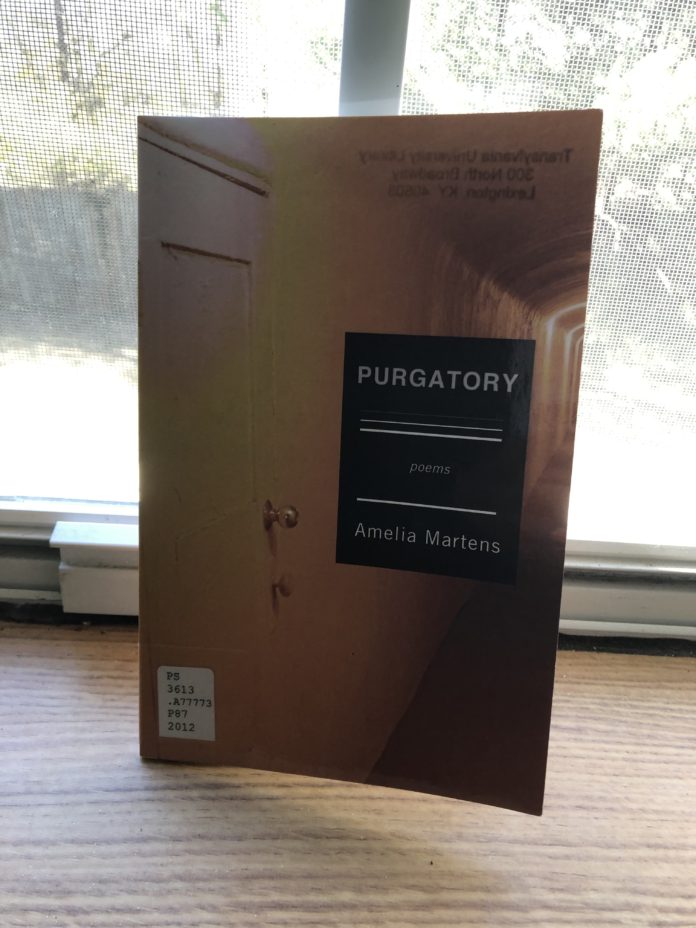Welcome to Lit Review, where columnist Dominiq Wilson will take apart a series of chapbooks to figure out what works and what doesn’t for the modern reader of poetry.
“Purgatory” is written by Amelia Martens, the same author of “The Spoons in the Grass Are There to Dig a Moat.” It’s a collection of 20 prose poems, and despite the various subjects this book discusses, all of them seem to take place in the middle of something like the title suggests.
Before going further, I will say that this chapbook wasn’t easy to navigate through. Each poem is untitled, which aids in the mystery of what point in time the poems take place, but when going back into the table of contents, the poems were marked by the first few words. Luckily for me, each poem is under a page long, so I will be referring to each poem by its page number.
It was clear to me that all of these poems are written in prose form, but unlike her other chapbook, these poems seemed to resemble streams of consciousness in the fact that some of these poems seemed to go off into an unplanned direction.
Having read Martens’ poetry before, I can say that this revelation isn’t new, but due to the wedge of time between the first reading and the second, I can say that I was thoroughly confused by these disconnected, run-on sentences. Despite this, as always, it made these poems very enjoyable to read. Take the third, for example:
“You stare at the electric coil, and wait for your watched pot to boil. You wear the first apron your mother made, out of the rocking horse curtains. Every time you take the lid off, the water is serene. Camel crickets skitter across the peach linoleum, and jump on a collision course with the backs of your bare knees. You wear white socks, the left one wet from the ice cube left to die just outside the freezer. You hold a baby spoon and tweezers. You realize, as you hear the roll of heat inside the thin tin pot, there is nothing to boil, nothing but insects.”
I noted that this poem may be about a lost family, considering the narrator mentions a mother-made apron and baby spoon without mentioning a mother or baby, but I can’t be too sure. There’s a lot of unnecessary information that throws that inference off.
Like her last book, Martens comments on social issues. In “The Spoons in the Grass Are There to Dig a Moat,” she commented on war and its effects on individuals and families, but she addresses other issues as well, such as beauty and the environment. The fifteenth poem mentions plastic almost too many times for me to think that the poem isn’t commenting on the use of plastic in our environment. Read it below:
“Your happiness is funded by solar panels and social security. Every day you sit on a park bench in the plastic universe and listen to the plastic blue bird feed his plastic chicks. Across the park, near the plastic public restroom, sits a mathematician. He eats egg salad sandwiches every day. First, he unwraps the plastic. You watch him do this through the figure eight of your plastic binoculars; the ones your parents would never let you use because they were afraid you’d break the glass lenses. Even now you feel their weight, and the plastic strap pulls on your neck when you let the lenses fall against your chest. All your life they never saw you, sitting in the backseat. Your face pressed against the window, tracking raindrops, the soft plastic of the window knob turning in your hand; there impressions were made, which looked like scars as you aged. You silly putty child, when are they coming to pick you up off this bench and put you back inside your egg?”
I enjoyed this book about as much as I loved her first, though the poems not having titles was a bit annoying while reading. Despite that, I do recommend that anyone should read it. You can buy it for around $9 or check it out in our campus library.




